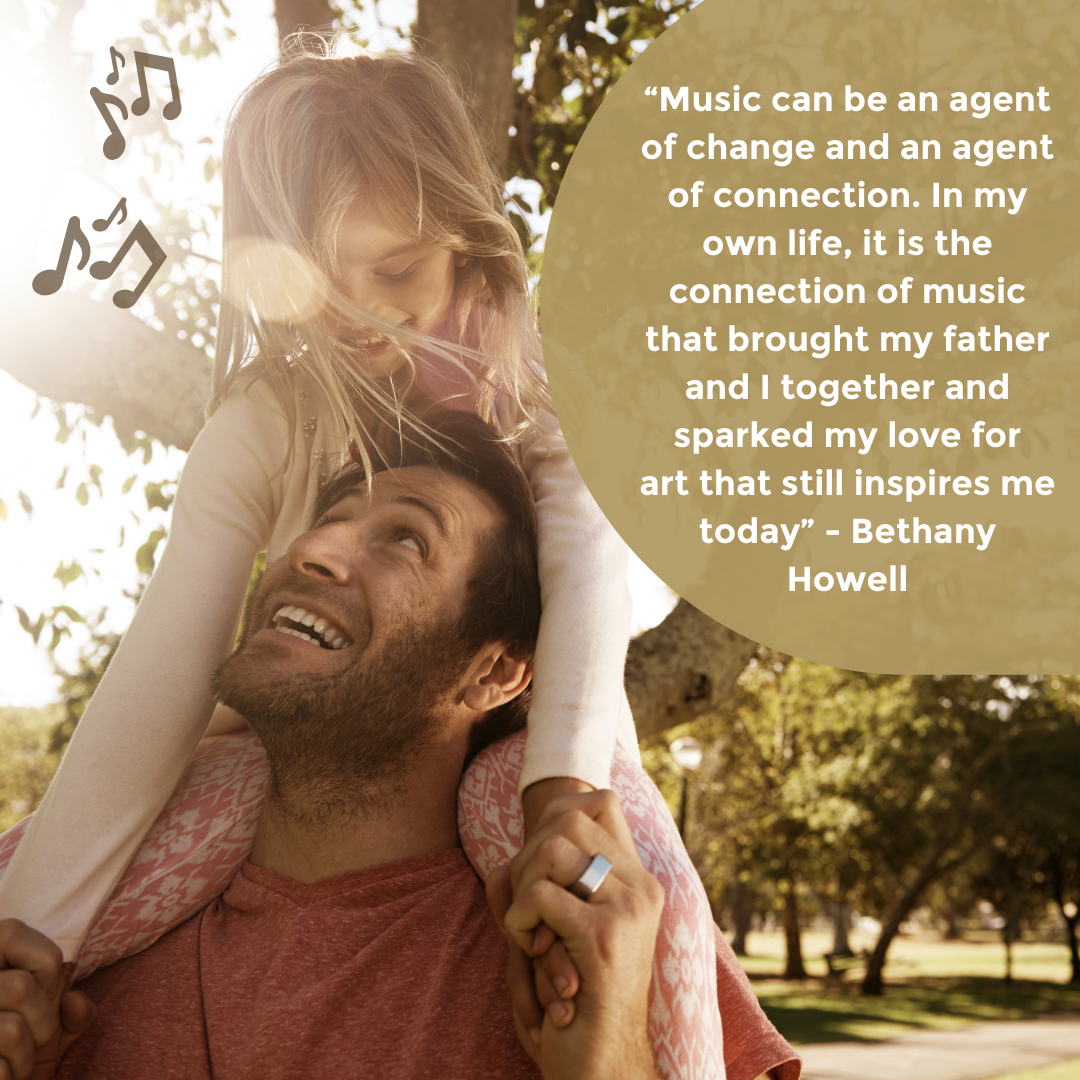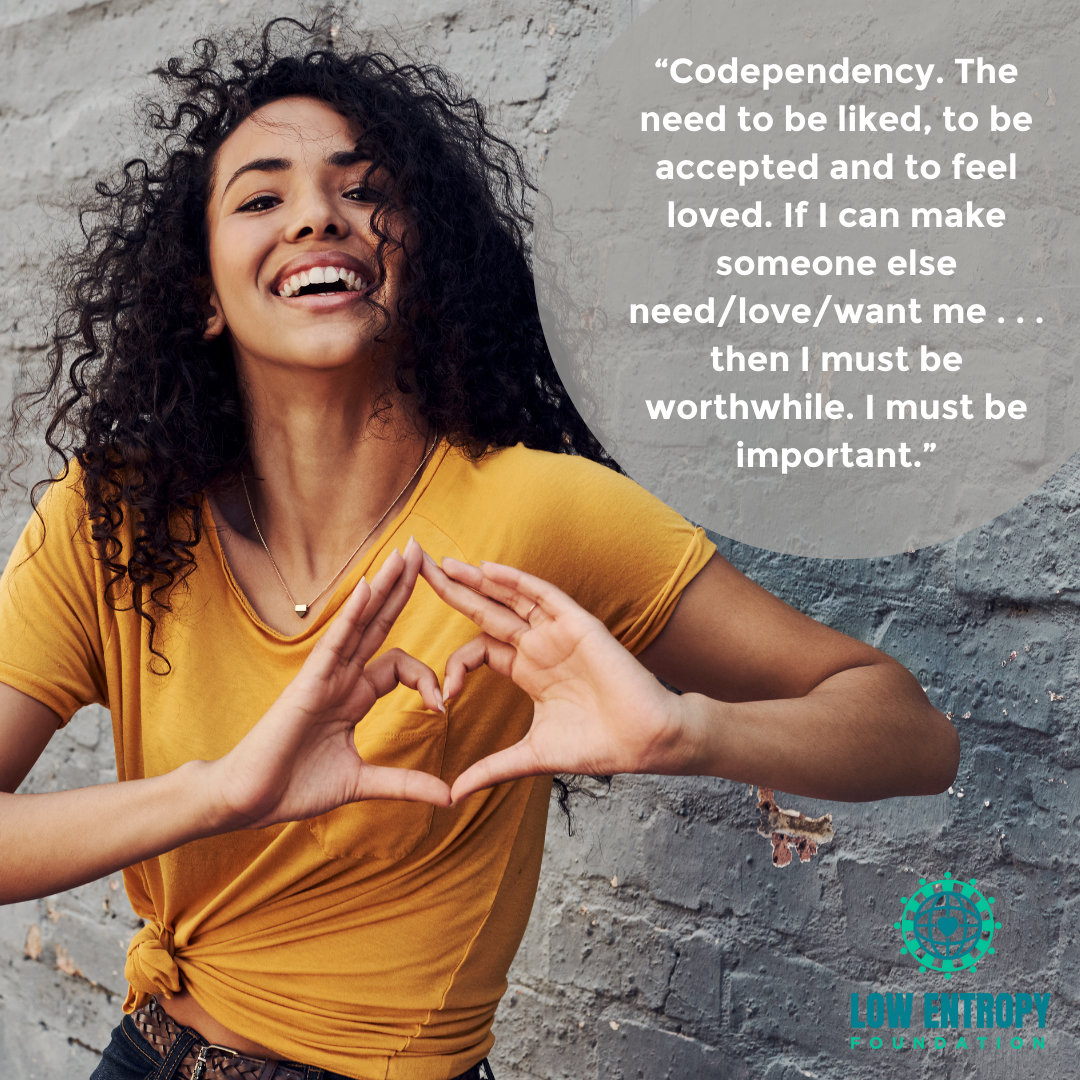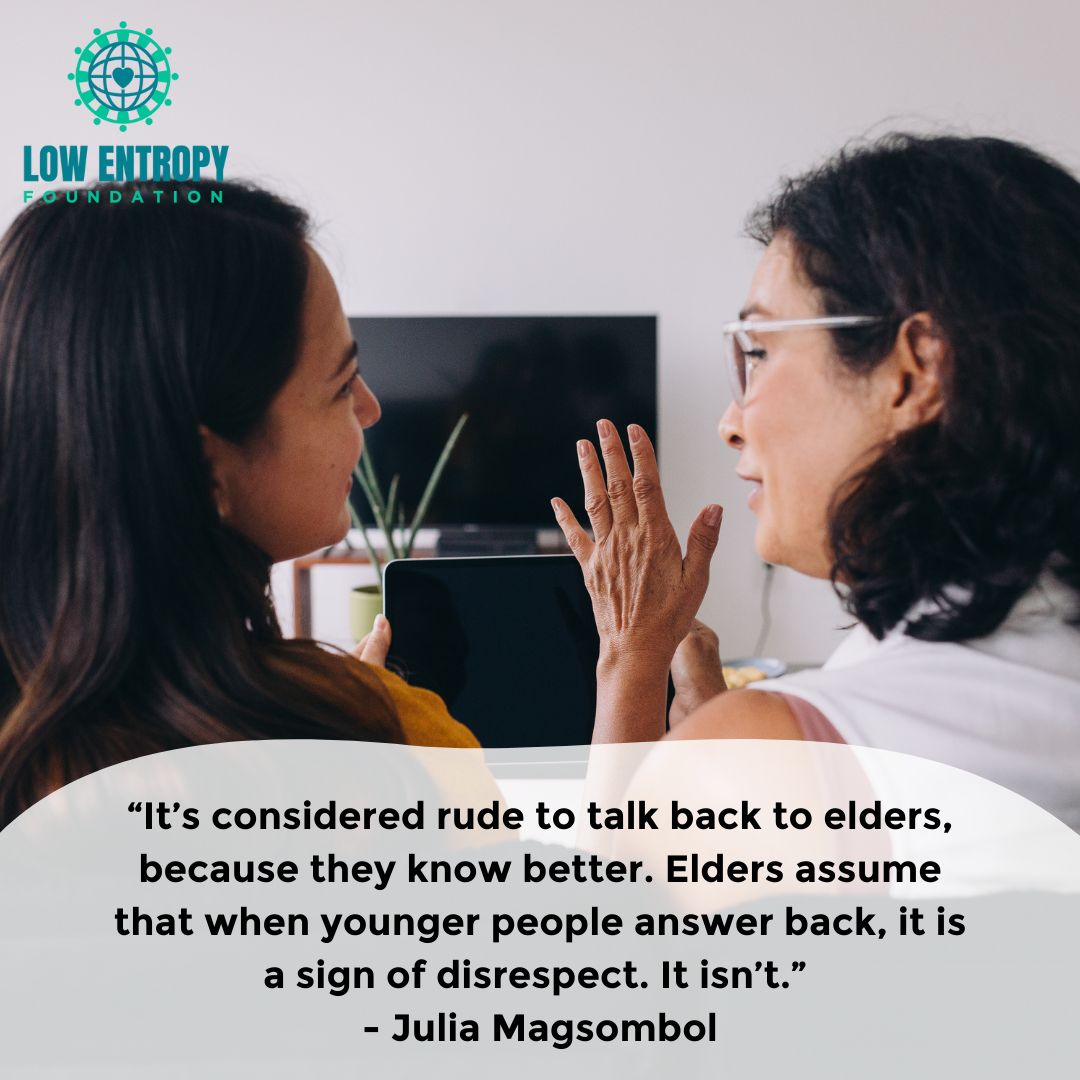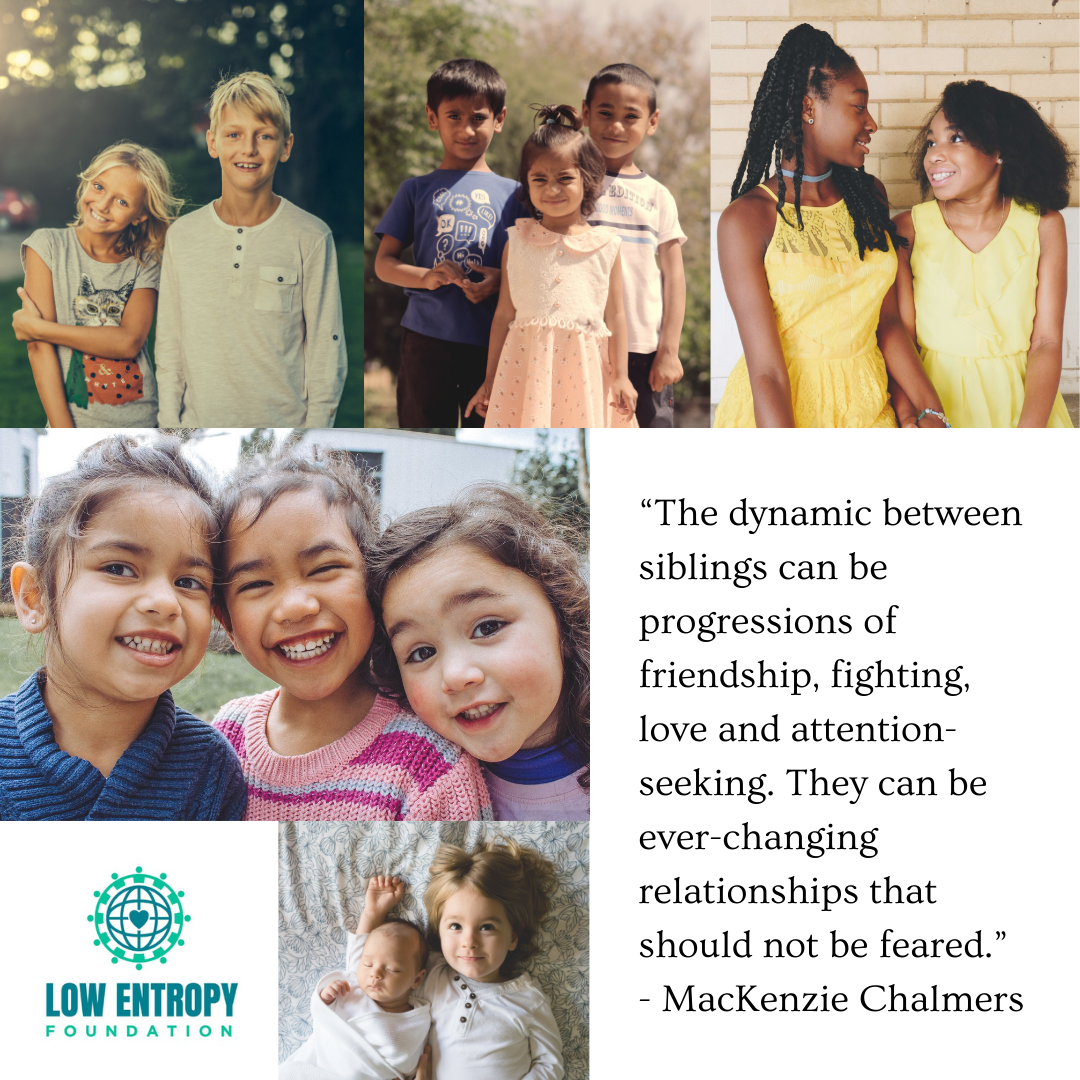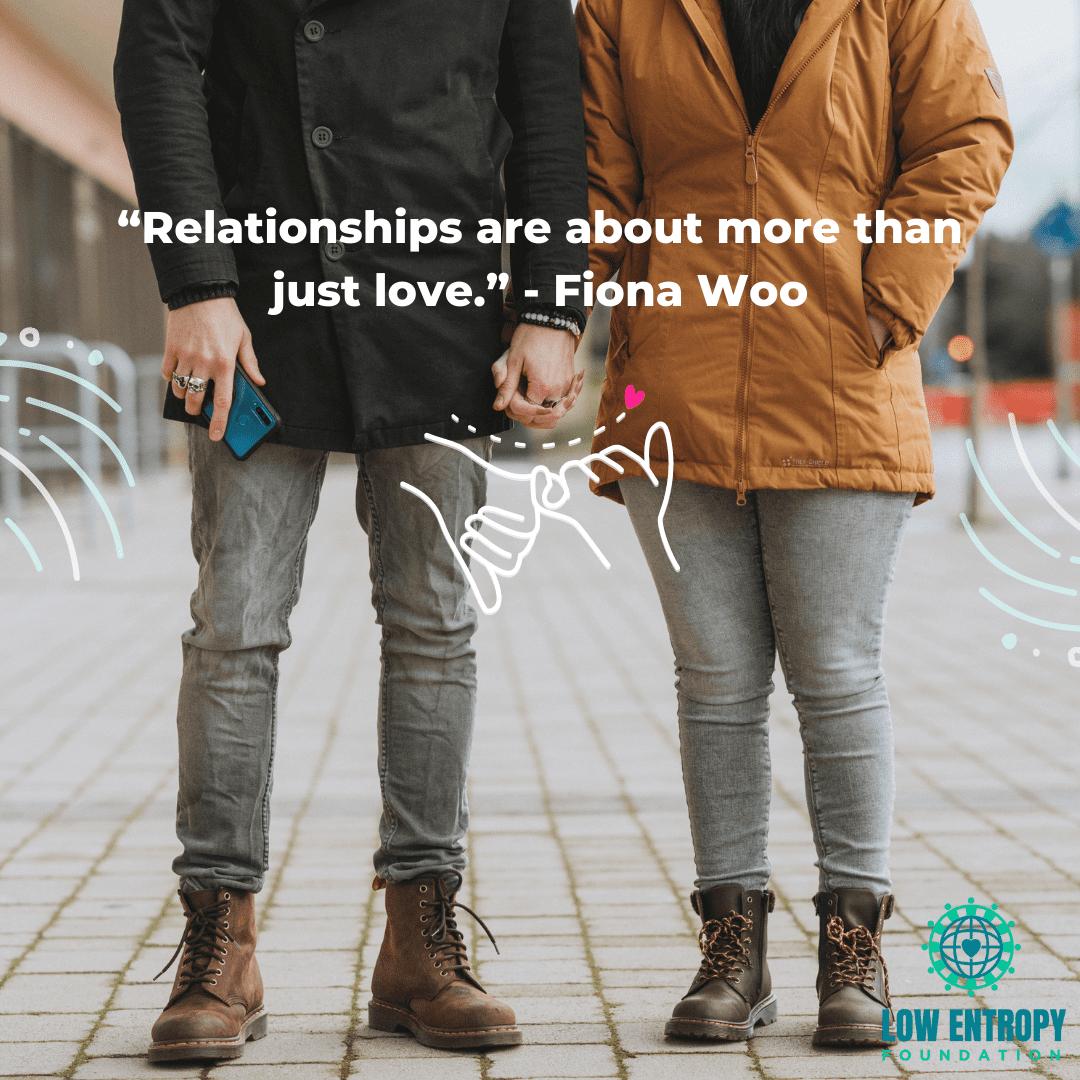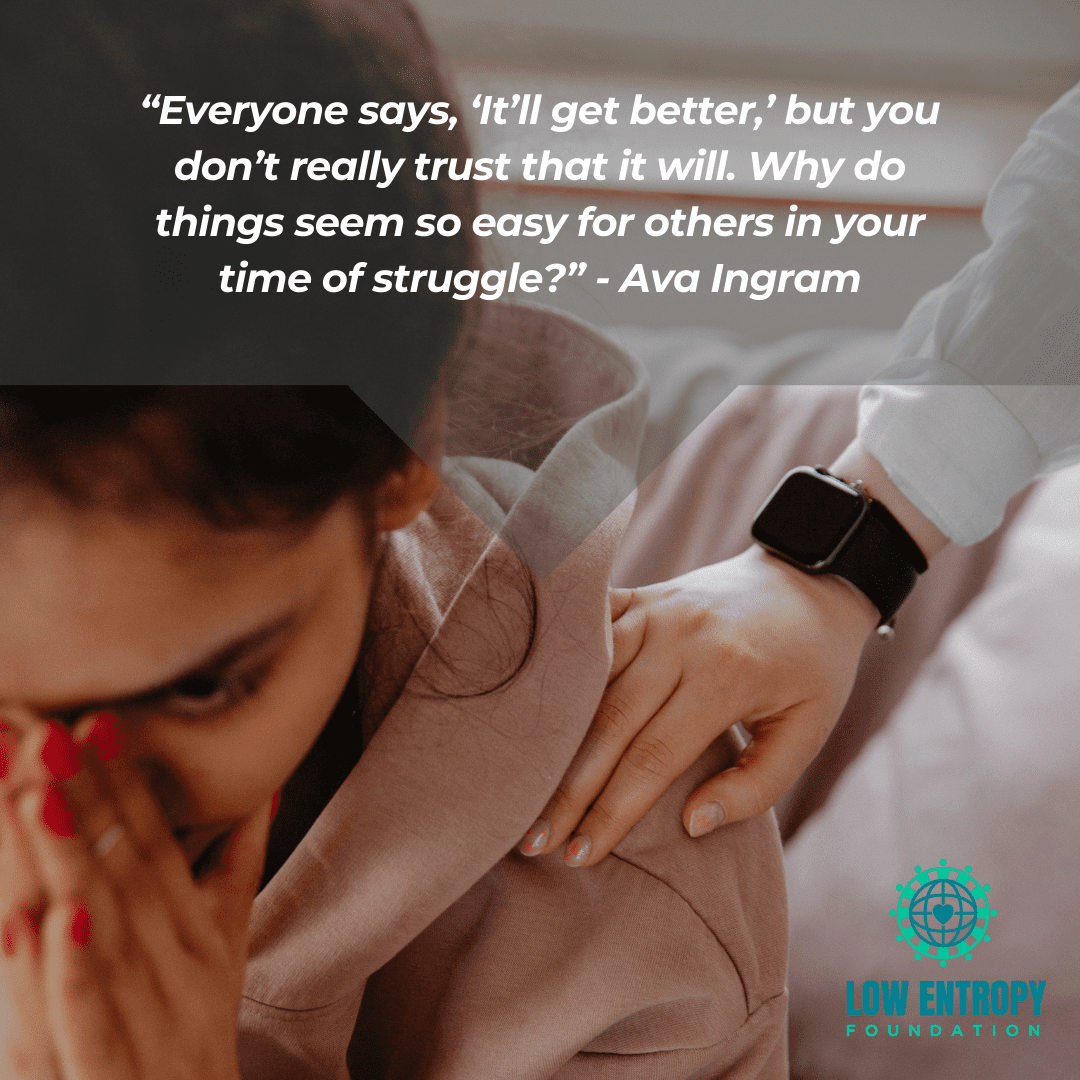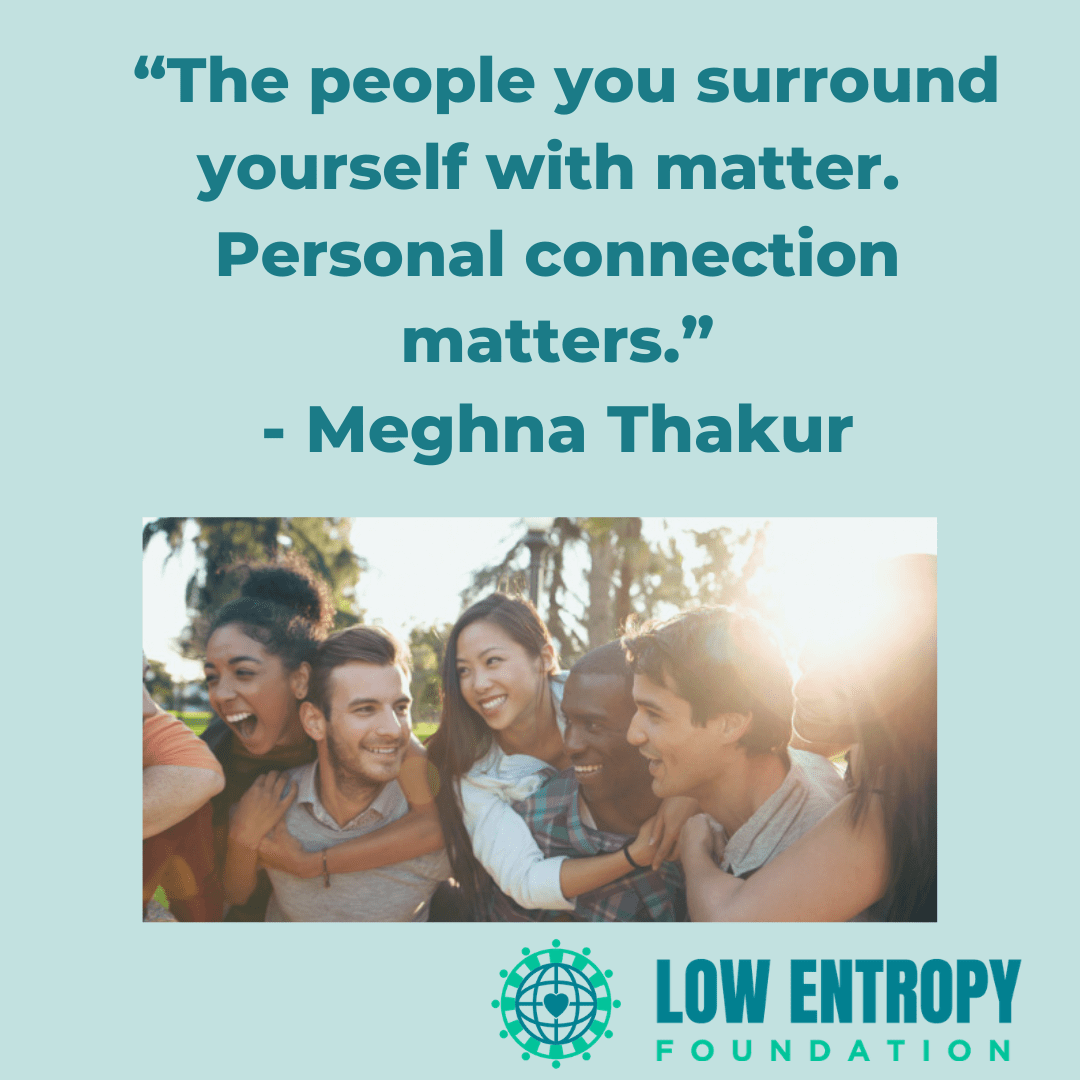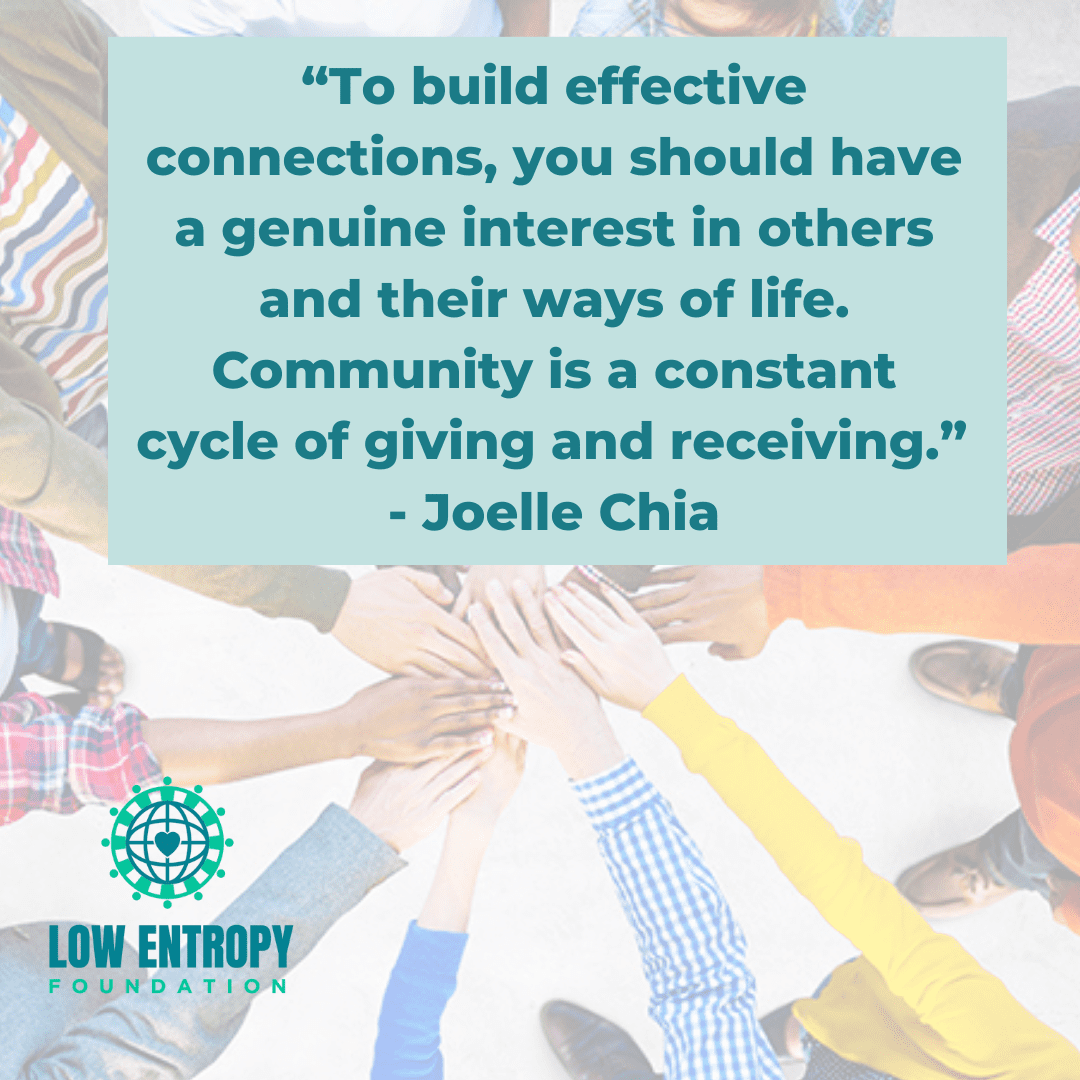Tag: relationships
Music: The Connection that Makes Us
Bethany Howell (she/her/hers), Low Entropy Volunteer Writer
I remember being four years old, in the back seat of my father’s old red Volkswagen. I would dance along to the songs he played, raising my arms as high as I could for the chorus “Hands up, baby hands up” while he laughed and sang along. There are few things my father and I shared, making our joint music taste all the more special to the both of us. As the years wore on and we became more distant, we could always bond over Duran Duran, Billy Joel, and David Bowie. My father and I are seldom close; but music, and the memories that came along with it, brought us together.
At age eleven, I began discovering music outside of the realm of my father’s tastes. I discovered modern rock, then alternative, then indie music. Artists such as Fall Out Boy, Glass Animals, and Vampire Weekend replaced the familiar sounds of 80s pop with which I had grown up. My father would always try to keep up, creating playlists with a mix of our favourite songs,
but I preferred listening on my own. With the new age of modern music came the disintegration of the only thing that he and I had.
I believe it was age eighteen when I finally began looking back at what I once knew. ‘Retro’ music was making a comeback and I was surprised to find myself already knowing the melodies and words to the songs being ‘discovered’ by my peers. Today I consider myself lucky to know all the lyrics to the ballads and karaoke classics. After all, it is pretty fun to shock my friends with my knowledge of classics obscured by time.
I fell in love with music before I knew what love was. All of my most cherished moments came with a soundtrack. Throughout my childhood, my love of music permeated into every piece of who I was and what I did. If I wasn’t singing made-up songs and playing make-shift instruments, I was listening to the music that surrounded me. Some would say that our political viewpoints or the people we idolize makes us who we are; others may say that the books we read or the people we love are more influential. I disagree. I believe it is the music we listen to, the lyrics we sing to ourselves while cleaning up and the tunes we aren’t afraid to butcher with our terrible singing voices. I am who I am thanks to not only my current favourite melodies, but also the songs I still somehow recall from almost two decades ago in that old Volkswagen.
My love of music still drives me today. Though I have attempted writing songs like I used to when I was a child, I find that they never live up to expectations. Lyrics and chord progressions are not my calling. I decided a few years back to, instead, focus on the rhythm and meter of poetry. This has brought me quite far, with multiple poems published and a few on the way. I know that not everyone would agree, but I believe poetry to be at the heart of music. Yes, the two have many differences, yet both are based on the same drive – the creation of something
beautiful. We all just want to create something that gets stuck in your head and moves you, whether that be literally or figuratively.
I love music for the same reasons I love poetry, film and all other artistic creations – the connection it brings us. Music brings us all closer together through sharing the same favourite songs or hating the same Top 40s artist. Music can be an agent of change and an agent of connection. In my own life, it is the connection of music that brought my father and I together and sparked my love for art that still inspires me today. I don’t believe that my work will ever make as great of an impact as John Lennon’s poignant classic “Imagine” or have the lasting legacy of Queen’s anthem “We Will Rock You”, but I do hope to make a small difference, even if it is only in my own life. I write for myself and in hopes that others may relate to the words I spill onto the page.
—
My name is Bethany Howell and I am a third-year university student majoring in psychology and minoring in family and child studies. I have a passion for writing and mental health, and my ultimate goal since age 13 has been to make a difference in the world through helping others, which is how I ended up here at Low Entropy!
Life After Toxic Relationships
Low Entropy Guest Contributor
All I’ve known is dysfunction, chaos and drama. This was the norm to me. I had a tendency to “fall in love” after only knowing someone for a week . . . I would chalk this up to fate or destiny! We’d been waiting our whole lives, and we finally found one another. The beginning of our romance novel was exciting and intense. We would think of each other all day, send one another countless messages, fall asleep on the phone together. We couldn’t get enough of each other. It was magic, the chemistry was beyond anything I’d ever experienced before. After a month or two, we couldn’t bear to be apart, so we quickly rearranged our lives and moved in together. Now the rest of our lives could begin, and we could live happily ever after.
But shortly after living together, I would recognize sides of him that I didn’t notice before, like jealousy and anger. At first, I thought it was cute that he was jealous.
“He just loves me so much, and he can’t stand the thought of losing me . . . awww, that’s so sweet.”
When he would have bursts of anger, I would tell myself that he needed me to love him because he’d never experienced real love before, and that’s why he reacted in such angry ways. I could be the one to love him so much that his anger would eventually fade away.
Not true.
His anger never faded away.
I must have replayed this movie four or five times. You’d think I’d get tired of the same old story, but I seem to find comfort in familiarity.
After my last dysfunctional relationship, I charged my partner with assault and was forced to go no-contact with him, due to the charges I placed on him. This helped me escape the trauma bond that I found myself in, once again. I finally interrupted my pattern of attracting toxic relationships and, at last, I’m free of the chaos, drama and dysfunction that I grew accustomed to.
So what’s next?
I find I have a lot more time on my hands to be with me. I’ve come face-to-face with who I am, and I’m forced to acknowledge all the parts of me. No longer can I distract myself in the chaos of a toxic relationship. Instead, I find myself . . . bored. If all you’ve ever known is drama and that drama subsides, normality can take some time to adjust to.
My codependent tendencies have shown up in other ways, but at least now I’m aware of them.
Codependency. The need to be liked, to be accepted and to feel loved. If I can make someone else need/love/want me . . . then I must be worthwhile. I must be important.
In reality, I have to need/love/want myself. I have to stop picking myself apart and start appreciating who I am and how far I’ve come.
Sure, there are things about me that I’m not in favor of. I can be cranky, selfish and insecure. But I can also be real, authentic and vulnerable.
Instead of focusing on all the things I don’t like about myself, I’m choosing to focus on all the things I do like about myself. I like my openness and willingness to learn. I like my “just do it” attitude. I like my fashion sense. I like my awareness and commitment to grow and evolve into my full potential.
I like what I’m doing right now. I like liking myself.
—
Leave your thoughts for us in the comments below — better yet, start up a dialogue with the Low Entropy community in person at a Conscious Connections meeting or online at our community site. You can also follow us on Facebook, Instagram, TikTok, Twitter and YouTube to stay up-to-date with Low Entropy news!
With All Due Respect
Julia Magsombol (she/her/hers), Low Entropy Volunteer Writer
“Youth are supposed to be society’s tomorrow, but that’s all gone now. Youth are horrible and disrespectful. You can never expect anything from them.”
A shocking line, isn’t it? It’s a line that I hear from different elders at every family gathering. Many young people may have heard it as well. And let’s all admit it: it’s tiring.
I grew up in a very conservative family. My family and relatives are all strong believers in our culture, and they strongly maintain traditions. Trust me, I have seen enough of our elders trying to judge and provoke younger people. It’s wonderful to listen to elders and to let them guide us, but their lectures can sometimes be difficult to handle.
Depression? It’s because you don’t have religion.
Last two years ago, I suffered from severe depression and anxiety because of school and personal problems at home. My face completely changed from before, when I was mentally stable. In the middle of winter, I was with my mom and we both went to a small grocery store. I didn’t look good. I was wearing an old hoodie and jogging pants. My mom knew all the people there who loved to gossip. The moment I entered the store, I could feel all the elderly women staring at me and talking amongst themselves. They said one thing to me: “You’re probably not okay because you have no God to believe in.”
The moment when those women said that to me, I was confused. I was a very religious person then. How could they criticize my belief and religion, just because I didn’t look good during that time?
When things sometimes don’t work in our lives, we can’t expect our religion to remove all our problems. It works for some people, but not for everyone. That’s one of the things that some elders should understand.
Sometimes, weight matters all the time.
As an Asian woman, our weight matters all the time. We should never gain weight and become fat. We are told that being fat is ugly and that no man could ever like us. My grandma used to tell my cousin to never get fat because it’s wrong and ugly. I clearly remember how my cousin became very conscious of her weight then and started eating less. She was only nine then. Sometimes weight does indeed matter. But remember, while weight may matter to some, it doesn’t have to matter to us too. We should never judge someone by their weight. We can eat what we want. We can be healthy. We can be ourselves. We don’t need to be skinny or have a specific weight for people to like us. We can appreciate ourselves for whoever we are.
Your dreams do not matter. Mine do.
We often hear from elders or parents that art or degrees that do not involve a doctorate or engineering are worthless. I dropped my dreams once. I hope others won’t do that just because their elders said so. It may sound a cliché, but we only live once. Life is too short to live for somebody else. It may be hard to achieve our dreams, but we should never surrender them because of others. We should still pursue them.
Stop discriminating against women.
“Women are a disgrace.”
Growing up as a woman in Canada made me realize how we are oppressed because of our gender and sexuality, and opened my eyes to the toxicity of our culture and family hierarchies.
When I was growing up, I noticed how my uncles used to brag about how their sons were doing things that involved their sexuality. My relatives took these comments as jokes, but there was no such open conversation for women.
I realized that there’s this belief from elders that women should not lose their virginity, but men should lose it right away. Women are constantly shamed for having sex, but men are always rewarded. Do those things matter? The concept of virginity should be gone, both for men and women. We should never be treated as lesser or greater because of our gender or sexuality.
You can never answer back.
Lastly, younger people can’t respond to elders. It’s considered rude to talk back to elders, because they know better. Elders assume that when younger people answer back, it is a sign of disrespect. It isn’t. We are only expressing our opinions.
Final thoughts: what should we do?
Those are some of the brutal experiences I have experienced with elders, and there are more. How do we handle this kind of dysfunction? The answer is left for us to decide, but we should remember that mutual respect must come first.
—
Julia Magsombol is currently a journalism student from Edmonton, Canada, who desires to bring hope to people through her writing. When not writing or reading, you can catch her sewing clothes, painting nature and drinking instant coffee.
Sibling Dynamics
MacKenzie Chalmers (she/her/hers), Low Entropy Volunteer Writer
The traditional idea of family has changed through our transforming society. Blended families are now common, creating various kinds of siblings:
Full Siblings: Siblings who share the same biological parents.
Half-Siblings: Siblings who only share one biological parent between them.
Step-Siblings: Siblings who are children of different parents who have married. These siblings are not biologically related.
Adopted Siblings: Individuals who are the biological children of someone else, but have been legally adopted into a family with other children. They are not biologically related to the children in the adopting family.
Foster Siblings: Individuals who are raised by someone who is not their parent, alongside that parent’s children.
Regardless of the type of sibling you have, similar sibling dynamics can be experienced. You could be the sibling that feels forgotten or invisible. You could be the sibling that feels a duty to protect the younger one. You could be the sibling that demands attention, or wants the attention to disappear. A sibling can be your best friend in life or your worst enemy. You may love spending time with them, or fight against them for everything.
The evolution of siblings’ relationships over time can be represented in four general ways:
- You are close when you are older, and distant when you are younger.
- You are close when you are younger, and distant when you are older.
- You have always been close growing up and as adults.
- You have never been close growing up and as adults.
In earlier years, the difference in age between siblings can significantly affect sibling relationships. A larger age gap can create distance between siblings, as you may lack shared experiences in the present.
Siblings who are very close in age, on the other hand, may struggle due to experiencing the same milestones at the same time. You may fight constantly, as both of you are living under the same roof or even share a room with one another, creating a lack of privacy and space. Tension might build, and all you might want is to be away from one another.
When siblings transition into adulthood, the dynamic can change. Both of you have left the family home and are in the process of forming new lives for yourselves. If you were close when you were younger, the process of post-secondary school, working new jobs, meeting new people and forming a new family can create a distance between siblings as communication decreases. In other cases, siblings can grow closer with age. You are not living together, and are able to enjoy each other’s company when you both desire. You can experience life on your own and get a new perspective on the other sibling when you do not have to see them every day. You can miss them now. Growing up, you may feel boxed in with your sibling, but now you might want to hear about their lives and ask them for their opinion and advice about situations you are both experiencing.
Age differences seem to be less noticeable as adults, and you can more easily bond over common interests and common experiences. Friendships can be formed despite age gaps.
The dynamic between siblings can be progressions of friendship, fighting, love and attention-seeking. They can be ever-changing relationships that should not be feared. If you are worried about the state of your relationship with your sibling – especially as adults – communication is key. There are many ways to communicate digitally if face-to-face is not possible. Video chatting and instant messaging are great tools. Pick up the phone and call them. You can be traditional and send them a hand-written letter. Let them know you are thinking of them.
Regardless of the state of your relationship with your sibling, they likely most understand your life, as they grew up with similar family dynamics. If it is possible to maintain a positive dynamic with your sibling, you’ll have a life-long friend with an irreplaceable familial bond.
—
MacKenzie is a digital media enthusiast with interests in various aspects of media. She takes part in novel hunting, photo and video creating and creative writing.
Lies on Love
It’s easy to toss around relationship slogans, but what are the implications of these simplistic principles? Low Entropy Volunteer Writer Fiona Woo picks apart some commonly-held beliefs.
As a serial monogamist, I’ve been in a fair number of serious and committed relationships. Recently I’ve been seeing a lot of relationship advice floating through social media that I have to say I fervently disagree with. The bulk of it feels like it’s coming from hurt, pain, and fear instead of truth, love and faith. Here are some of the things I hear and what I believe is true and untrue about each claim from my perspective:
- If he wanted to, he would.
I love this one. It makes me laugh. Think about all the times you’ve wanted to do something and didn’t. Everybody is wired differently and we have our own ways of reacting to situations. Just because you would do or act a certain way in a situation, does not mean other people would do or should do the same. Ultimately, things are rarely this black and white, especially in terms of romantic relationships. It is important to look from different perspectives:
- Do their words match their actions?
- Do they make you feel safe, or do they withdraw emotionally when things are difficult?
- Are they putting in effort in ways that you wouldn’t but still show obvious signs of care?
- Does your expectation of effort match the effort you put in and the stage of relationship you’re in?
Have the courage to get yourself out of clearly harmful or dishonest relationships, but have the grace to give your partner the benefit of the doubt when they’ve messed up and you know their intentions are pure.
- If you don’t accept me at my worst, you don’t deserve me at my best.
If you take this at face value, you should be able to be a jerk and the other person just has to take it, right? Wrong. It would be lovely if we could love unconditionally, but healthy relationships require boundaries. Obviously everybody has good and bad days, and it is unacceptable to only be kind to your partner when they are happy and pleasant. However, if you think it is your partner’s responsibility to simply accept and love all of your flaws and negative traits, you are mistaken about what love requires. Love is supportive and caring, but it is also honest, and it is not blind. It is our responsibility as mature adults to try to be better and give our partner a pleasant human being to live with. Creating a healthy relationship comes with responsibilities. If you do not want to take on these responsibilities, don’t attach your life to another. In the same way that it is a parent’s responsibility to be pleasant and try to do their best for their children, you have that same responsibility as someone’s partner. At the altar, you are vowing to and promising someone a life that would be better with you than without you. If not, why would people take on the stresses and difficulties of being in a relationship? We must have grace for each other’s downfalls, but also work to give the best version of ourselves to those we love most. Give and take, that’s what it’s about.
- You deserve better.
I see people use this as an excuse not to put the necessary effort required for relationships or to defer responsibility from themselves onto the other. I laugh to myself when people say this and I think in my head, “But do you, really?” It is fully possible that you actually do deserve better, but I guess I just want to play devil’s advocate and put the responsibility back onto you. Only when you take responsibility for your part in the situation do you have the power to change or fix the problem. Resist the urge to see relationships from a perspective of who’s better or worse. If they don’t meet your needs, then leave. Relationships are about compatibility. I think that the less we see others as evil, and more as simply human and imperfect, the better our relationships with others can be. Yes this is a very naïve and innocent way of seeing the world, but it’s how I choose to see people. Yes I’ve been burned by this thinking before, but I still think it’s better than the alternative of being cold, untrusting and bitter.
- All men are trash
This is just a downright dangerous thing to believe. One, all men are not trash, there are plenty of quality men in the world. Two, it’s not like women are much better. There are inherent differences to the ways women and men are wired, and this causes many problems in relationships. Growing up with many close male and female friendships, I can tell you, they are fundamentally different. Men are straight forward, they generally mean what they say and act in accordance to whatever feels right in the moment. Women are convoluted, they craft their messages carefully and act in alliance to what will help them get what they want long term. Herein lies the problem: we communicate and act in different ways. Hanlon’s razor is a principle that says, “Never attribute malice that which is adequately explained by stupidity”. Men want to make their partners happy just as much as women do, and they fail at it just as much as women do. When you look at every man with disgust you will probably get what you are looking for. You must give trust to receive it. Give people the benefit of the doubt, and then if they betray that trust, walk away. Relationships don’t need to be a big game.
- If he really loved me, then X, Y and Z . . .
This is just a general observation of people’s attachment to what love has to look like or mean. I believe two things:
- True love is without attachment or expectation.
- Relationships are about more than just love.
If you believe that relationships work if there’s enough love and don’t if there’s not, your ideas about relationships may be too romanticized. Love is about having care for another regardless of the situation, but having a relationship is about building a life together. Somebody can genuinely love you and still prioritize themselves over you. Selfishness is a natural and necessary aspect of human evolution. The best way to love your partner is with a sense of detachment that allows both of you space to thrive as individuals. On the other hand, if you value partnership, you will have to embrace a level of sacrifice to do things for the benefit of your partnership that may or may not be immediately beneficial to you. Healthy relationships are a balance between the desire to be loved and the desire to give love. The partner who can achieve an ideal balance with you is the relationship worth fighting for.
Are there any common relationship notions out there that grind your gears? Vent a little in our comments section, or on any of our social media platforms – that’s what the internet is all about!
Over It
They say that breaking up is hard to do. Ava Ingram knows that it’s true. Ava got through it though, and the Low Entropy volunteer writer shares her best practices on sorting out the aftermath.
You’ve done your best, and given your all. You’ve had enough of the emotional roller coaster ride and gaslighting your partner was putting you through. You need to find a way out . . . then they decide to turn around and break up with you first. What’s next?
Give them a second chance to prove themselves, one last time . . . but when they screwed that up again . . .
A sense of relief.
They said they’d always be there for you, but in the end, you were just left trying to take care of yourself. And everything you said to your partner, they just turned around and fired back at you.
What’s helpful in these times when you feel like you want to punch someone, like all hope is lost?
Taking an “easy way out” with drinking or using drugs wasn’t for me. I chose the harder route, but I knew that I’d have to deal with it myself because, until I had somewhat processed it, I would never be able to move forward and love myself, or anyone else, again.
When you’re sitting in your bed all alone in the dark, thinking, “Everything’s useless,” “I can’t do anything,” and “I’m no good,” it’s a start to think, “At least I’m trying to get better.” It’s very hard to try and trick/reroute your brain when you’re in a dark place and don’t see the light at the end of the tunnel. Everyone says, “It’ll get better,” but you don’t really trust that it will. Why do things seem so easy for others in your time of struggle? How do they seem to get by with nothing crappy happening to them?
The hardest part for me was dealing with empathy. I’m a very empathetic person, but it can come back and bite me in the butt. I felt very bad for my boyfriend after we broke up the first time. He was dealt a bad hand, as he’d had a rough childhood. I felt bad for him, his family and his pets, as they were stuck in that “welfare mentality” and didn’t want to get better. He’d once told me he wanted to get fit. And my mom explained to me that, in the same way mentally, I couldn’t “work out” his brain for him. He’d have to change for himself, and if he never did, that wasn’t on me. It was a hard pill to swallow, but it was true.
Medication is an aid, but there are some issues that medication can’t magically fix if you don’t confront them head-on.
Surrounding yourself with a good support group is always good. You might not always like your family members, but in my experience, mine have always been there for me in my time of need. Therapy is helpful. Helping you be aware that you want to get better is the first step, but you have to want and be able to put in the effort, even when the going gets tough. I’ve been told it’s good to “feel things through,” but at the same time, it shouldn’t give you permission to sit around and feel crappy all day, soaking in those feelings. At some point, you’re going to have to confront your fears of returning to work, and resume life as “normal.”
I showed up to work a few days after the breakup. It was hard keeping it together, and then I just sort of lost it all at once. That was embarrassing, and at the same time, I was like, “How am I gonna keep it together for the remainder of my shift?” Somehow, I just did. Don’t get me wrong, it was extremely hard, and I lost it again after work. But somehow, with practice, it gets a little easier. I’ve heard a good way to calm anxiety is to say, “I’m ok,” but in that moment, you don’t really feel ok, so it’s really tough.
Watching a movie as a distraction was always helpful. But that was just it, it was only a distraction, and wasn’t dealing with the actual issue at hand. The one thing I learned was the PERMA-V model. The “P” stands for positive emotions. So this would be the time to watch something that makes you smile, or that is funny. The “A” stands for achievement. If writing/being creative is one of your gifts, find something to do that involves that. This is a good distraction.
Golden nuggets are another very useful thing I’ve learned. Counting your blessings/things that make you happy is a good way of focussing your brain on the good instead of the bad.
After you’ve cooled down a bit and had time to process the situation, putting yourself out there to potentially get judged and ruined again is very hard to do. But in the end, if you don’t try, you’ll never know what you could be missing, which is a very hard pill to swallow. And if I didn’t do that, I wouldn’t be in the good place I’m in now.
Same dating site as my ex. Kept looking. Losing hope.
Then some guy messages me, asking who my favourite Avenger was. It was everything that wasn’t in my last relationship, but everything I wanted. Everything seems good, and right, and not like you have to explain why you’re doing everything. You don’t feel on edge/living in survival mode at all. Good communication that goes both ways, and just enjoying each other’s company.
It’s hard to work on yourself in order to find this kind of happy, but in the end, it’s well worth it.
Who’s your favourite Avenger? Tell us all about your kind of happy in the comments below, or on one of our other social media channels!
I Can.
Isolated from her family and mired in feelings of inadequacy, Low Entropy Volunteer Writer Meghna Thakur hit a low point before gradually emerging from it. Reflecting on that time, Meghna is now putting pieces together to create essential personal supports.
It always starts with the same thought, “I don’t think I can,” in one form or another . . . a small, niggling feeling. Sometimes it’s easy to ignore, but other times it takes root and won’t let go. Then that thought becomes a faint whisper and, if not curbed, gains strength until it’s a loud inner monologue that is difficult to silence.
Self-doubt has been a constant companion in my life from a very early age. Though the term has a negative connotation at face value, I have had both positive and negative experiences dealing with it.
I grew up in a family of highly talented artists and well-educated professionals in the science, technology and medical fields. It was quite a legacy to live up to. Most of my young life was spent trying to excel in my studies or extracurricular activities because, whether I was aware of it or not, there was always a need to measure up, to prove myself. Growing up, I channelled those feelings into determination, which pushed me to constantly improve and learn. I discovered my love of reading all kinds of literature, my fascination with science, a passion for sports and a knack for analytical and logical thinking. On a personal level, it drove me to explore a plethora of hobbies before focusing on what interested and inspired me.
However, the motivation borne from these feelings of inadequacy was a double-edged sword. I left my home country to pursue a master’s degree abroad and naively believed that any challenges I faced could easily be tackled if I was simply determined enough. But being alone and away from everything that is familiar to you, that little whisper of uncertainty (that can usually be easily drowned out when you feel secure in your environment) can rapidly transform into something far more insidious. Within a month, I started fearing that I did not have what it takes to get through the rigours of this new, unfamiliar international education system. Coupling that with the fact that my family had just spent a significant chunk of their hard-earned savings to give me this opportunity led to me suffering several panic attacks. At my lowest point, I hadn’t slept for almost four days straight and had barely eaten a meal that didn’t come straight out of a ready-to-eat packet. I would stay up all night crying with my family, wishing they could be with me, but at the same time knowing that wasn’t a viable option. They even tried to persuade me to give it all up and just come home, and we’d figure out the next step together.
Looking back, what truly helped me get through that dark period were the friends I made at university. We were all in the same boat together, and knowing that they shared the same uncertainty and fears was a huge comfort. They lent an ear free from judgment or reproach, and I had never been more grateful. I realized that, though my family and friends back home would always have my back, it was important to build a local support system to feel a sense of community. The people you surround yourself with matter. Personal connection matters.
This lesson has never been more relevant than now. This pandemic has brought to light many things that I have always questioned but chose to ignore, because there was always something I could use to distract myself: travel, weddings, entertainment . . . But in the past year, with all those diversions gone, I have struggled with significant aspects of my life, like my choice of career, the place I live and what matters most to me.
I have found that a combination of the approaches that worked for me thus far has helped a great deal. I have forced myself to come to terms with things that no longer serve or satisfy me. This has re-ignited my drive to wholeheartedly pursue endeavours that bring me joy, and I have faith that success will follow. The very nature of the current situation prevents us from seeking out personal physical connection with those we love, and it has been difficult having to rely on solely virtual means. Nevertheless, I try to focus on keeping connected with my social circle (near and far) and checking in with them, and remind myself that I still have a great support system.
However, what became painfully clear was the severe lack of friendships I had formed in the two years that I have called Vancouver my home. To try and get out there and make friends, I took advantage of the partial lifting of restrictions last summer to join hiking and outdoor adventure groups. This led me to meeting some wonderful people from various backgrounds that I probably would never have met. Most recently, I have started volunteering at local non-profits, which is what led me to Low Entropy. The feeling of acceptance and positive reinforcement that I have felt from my peers here has helped me feel a renewed sense of belonging and has helped calm that nagging voice that probably won’t ever truly go away, but can be relegated to the sidelines where it belongs.
Meghna definitely belongs here, and you do too! Join our loving and empathetic community by participating in a Conscious Connections group chat, or simply drop us a comment here or on one of our other social media channels – we’re super acceptance-y!
Finding Your Community
Looking to expand your social circle? Low Entropy Volunteer Writer Joelle Chia has five tips for finding your entourage.
“What is important is family, friends, giving back to your community and finding meaning in life.” These words said by Adrian Grenier may seem simple, but they shed light on the importance of kinship. In this context, community is a group of like-minded individuals who share similar ideas, beliefs and experiences, and who seek to feel less alone in their individual quest. Everybody’s existing communities differ, and each person is at a different stage in their life. It can be difficult to find an understanding and accepting group of people. Some may even feel that they don’t belong or fit in with their current groups, and if that’s you – not to worry! Your community could help you navigate life through thick and thin. Here are five tips to find the right community and nurture these healthy relationships:
- Assess your personal needs and wants
The first step is to consider where you are in your life. Perhaps you are a freshman at a new college, or maybe you just moved into an unfamiliar neighborhood. Regardless of how far along you are in life, ask yourself: “What exactly am I looking for, and what challenges do I currently face?” You may come to a conclusion that, after moving to a new college away from home, loneliness arises from being thrust into a new environment where you do not have the support system you once had. This question and answer process will operate your drive to search for community. When you state your needs, those needs are more likely to be met.
2. Don’t be afraid to be you
The phrase “just be yourself” may sound cliché and overused, but it holds true when you are looking to find a like-minded community. People tend to be drawn to those who share similar personalities, experiences and beliefs as them. This means not being hesitant to share your interests and passions, and being confident in your own skin. When people show more of themselves and have an authentic outward profile, others will naturally gravitate towards them. Put this into practice the next time you are in any public setting or group event. Chances are that you will discover you have more in common with others than you thought, and remember: the first step to finding people like yourself is to show up as yourself.
3. Get familiar with your local environment
Many communities are created by proximity and a common location. This can be explained by a phenomenon called the mere-exposure effect. It holds that people tend to develop preferences for familiar things. Applied to communities, the mere-exposure effect suggests that the more exposed to the same group of people you are, the more familiar you will become to each other, and the more likely friendship will arise. For example, if you recently moved to a brand-new city and are looking to meet new people, a great option would be to join regular local events you are interested in. When you become familiar with people you see regularly, bonds can form. The internet is a great place to start the search for a nearby location to find others like you.
4. Do not be afraid to ask others
Many people were introduced to loved ones and their present community through connections. Even if you are an introvert (like I am), it is always possible to build amazing relationships with people you think are similar to you. Test the waters to try different opportunities, including online and local groups. You can even ask for recommendations from acquaintances, and be open to meet individuals through existing relationships. The further you expand your network, the more likely you will be able to find the right people to be a part of your community. Checking around and being curious to meet new people are some of the best ways to find a fit.
5. Actively listen
Though it is important to seek out opportunities for yourself, sometimes it is easy to be caught up in your own needs. To build effective connections, you should have a genuine interest in others and their ways of life. Community is a constant cycle of giving and receiving. If energy is not put in to know others on an interpersonal level, it will be difficult for a sense of community to take shape. Oftentimes, what many need is someone to listen to and understand them. When you are able to listen well and show others your appreciation and thoughts, a deeper connection is born, which will revitalize your relationships.
If you’re looking for community, you’re in luck! Low Entropy has a great one, both online and in person. Whether it’s right here in our comments section, on our Instagram or TikTok accounts, or at a Conscious Connections meet-up, we’ve got supportive, empathetic people who will welcome you with gratitude and positivity.








